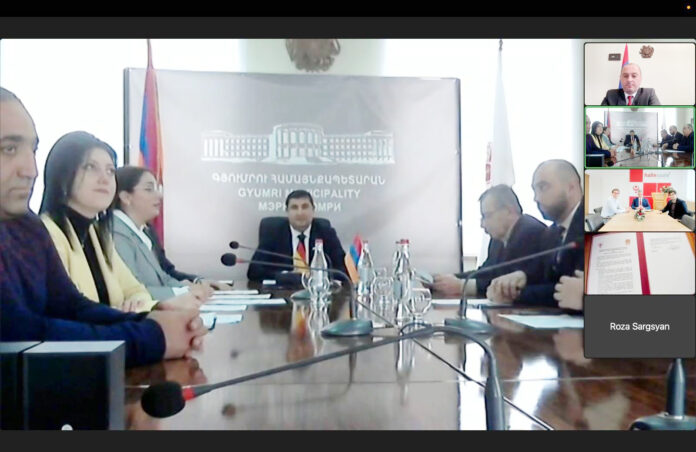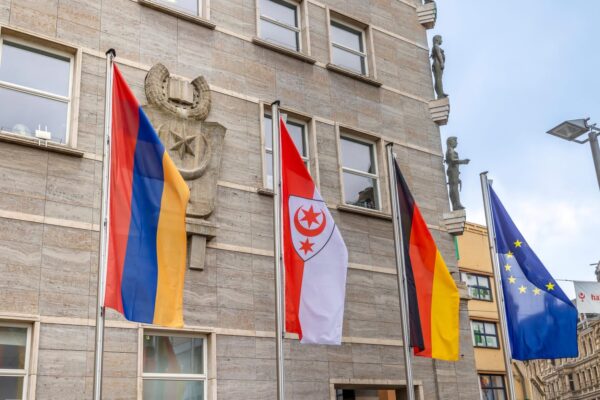
A screenshot from the meeting
Gyumri and Halle Become Twin Cities
by Muriel Mirak-Weissbach
Armenian Mirror Spectator
APRIL 6, 2023 — To judge by the number of visits to Berlin by Armenian political leaders, relations between Germany and Armenia are entering a new phase. In early February, Foreign Minister Ararat Mirzoyan came for a two-day working visit, and a month later Prime Minister Nikol Pashinyan arrived, followed weeks later by Alen Simonyan, President of the National Assembly. All three held extensive meetings with their German counterparts, as well as a host of representatives from the political, cultural, and economic world. Discussions covered not only bilateral matters, but also strategic issues, including the war in Ukraine and the humanitarian crisis in Nagorno-Karabakh.
Such high-profile visits may have overshadowed another encounter; though not primarily political in nature, it has far-reaching implications for developing cooperation on multiple levels and over the long term. This was the ceremony on March 6, in which Gyumri and Halle (Saale) officially sealed their status as sister cities. The festive event took place simultaneously in both cities, joined in a video conference, attended by the Mayor of Halle, Egbert Geier, and his counterpart in Gyumri, Vardges Samsonyan, as well as Armenian Ambassador in Berlin, Viktor Yengibaryan, Honorary Consul of the German Federal Republic in Gyumri, Alexan Ter-Minasyan, and the chairman of the Board of the German-Armenian Friendship Society Halle-Gyumri, Armen Klisch.
The idea originated from the Halle-Gyumri German-Armenian Friendship Society (https://www.agsa.de/german-armenian-friendship-society-halle-gyumri.html), which was founded in 2020. Like other sister-city agreements, this was to foster partnerships between the two communities, their schools and university institutions, and to sponsor group visits.

The Armenian flag outside the Halle city hall (Photo courtesy of the German-Armenian Friendship Society Facebook page)
The Friendship Society has been providing support for Armenians moving to Halle, helping them to get acquainted with the city, and encouraging cultural exchange. Halle is the most populous city in the federal state in Saxony-Anhalt and is home to a small (just over 100 members) but active Armenian community. It, together with its Armenian Apostolic Church Surp Harutyun in Halle-Ammendorf, has cultivated contact with Gyumri, which is Armenia’s second largest city and the cultural capital. Halle is one of the few cities in Germany that host a Khachkar, two others being Bremen and Braunschweig. It was the Armenian community’s initiative.
In May 2015, just weeks after the commemoration of the centenary of the genocide, a monument honoring the memory of the victims was unveiled in Halle, in the presence of church and state representatives of Armenia and Saxony-Anhalt. Beneath the stone cross are inscriptions in Armenian and German, which read: “This stone cross has been erected in memory of the millionfold victims of the Armenian genocide in the Ottoman Empire in West Armenia. Prayer and blessing for our martyrs. In commemoration of the Armenian victims and the German helpers of the survivors. Armenian Community of Saxony-Anhalt and the City of Halle 1915-2015.” Between the two texts is an image of the Tsitsernakaberd memorial in Yerevan.
Halle is also the site of the interdisciplinary MESROP Armenian Studies Center of Martin-Luther-University Halle-Wittenberg, established in 1998 as part of a joint memorandum on cultural and scientific cooperation between Saxony-Anhalt and the Republic of Armenia. Its founding director was Dr. Hermann Goltz (1946-2010), a well-known genocide researcher, and it is dedicated to strengthening Armenology in Germany.
Addressing the official ceremony by live linkup, Ambassador Yengibaryan praised the years-long cooperation between the two cities, especially in the areas of education, science, and culture. He stressed the commitment of both sides to live up to the goals of the twin city agreement, which marks the beginning of new contacts between people, the construction of new partnerships, and further joint initiatives.
During the ceremony in city hall, Halle Mayer Egbert Geier also underlined the fact that the two cities share a rich cultural heritage. At the same time, he said, they both “face challenges in social, economic, and political transformation.” Here he noted the role to be played by the Future Center for German Unity and European Transformation (Zukunftszentrum Deutsche Einheit und Europische Transformation). Very recently, on March 1, Halle was selected among many candidates to be the site of this new institution, and its scientific, cultural facilities played an important role in the decision. The Future Center is to honor the achievements in the eastern states of Germany. In the words of Chancellor Olaf Scholz, when he welcomed the jury’s decision, it is not a matter of “nostalgia, but rather the acknowledgement of the important experience of East Germans during the peaceful revolution in the GDR and reform movements in eastern Europe.”
Simultaneously, Gyumri mayor Vardges Samsonyan signed the document in his office, and was linked by video hookup. Samsonyan stressed that existing relations, “above all in the scientific realm at Halle University and social relations through the Armenian community, constitute a good basis for the partnership.” Specific projects and activities to be undertaken jointly will be drawn up over the next months. And he concluded with congratulations to Halle for having been selected to host the new Future Center.
To celebrate the special occasion, the Armenian flag flew over Halle’s city hall.